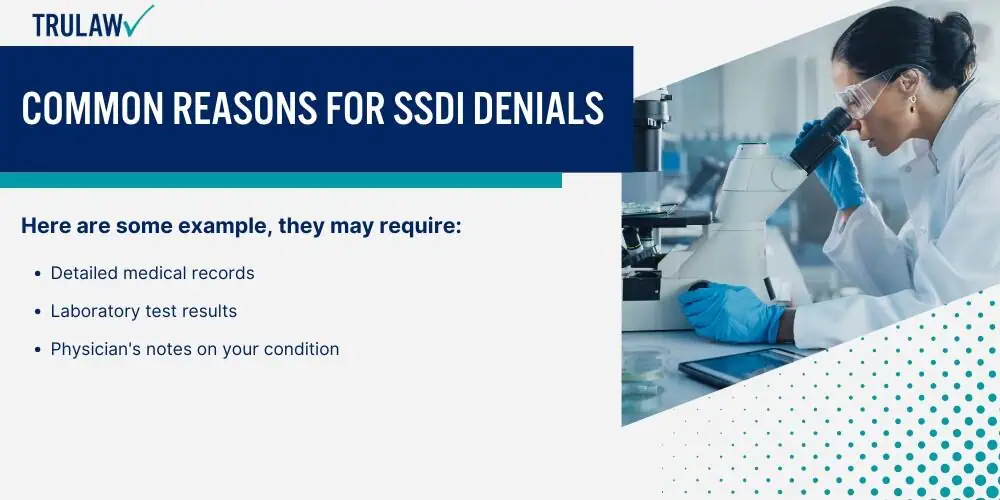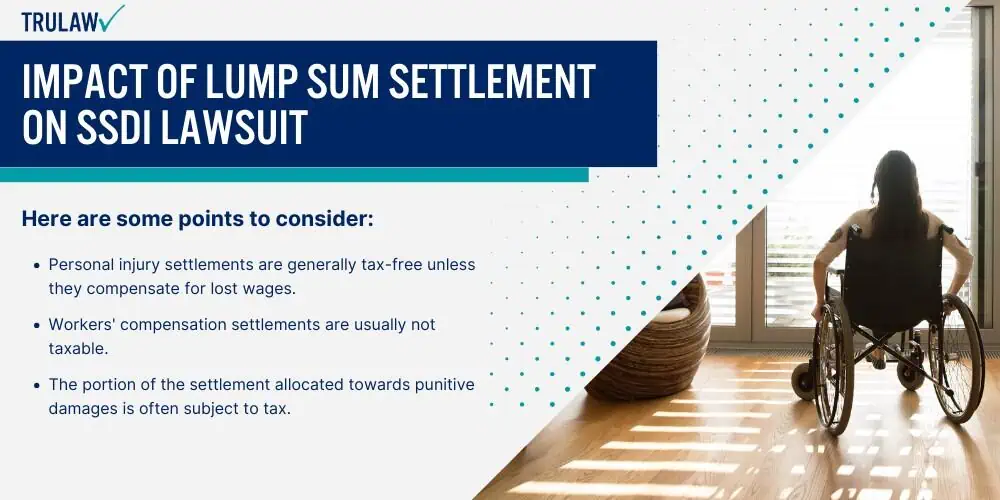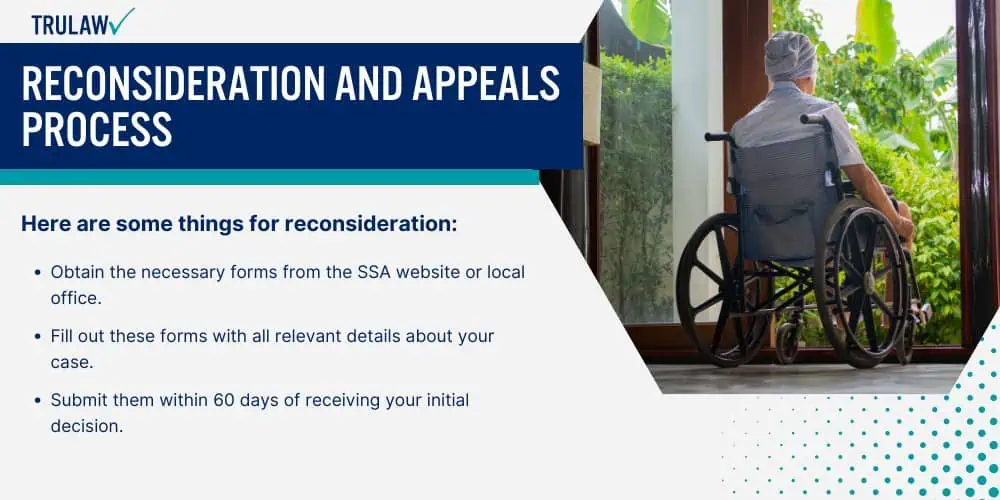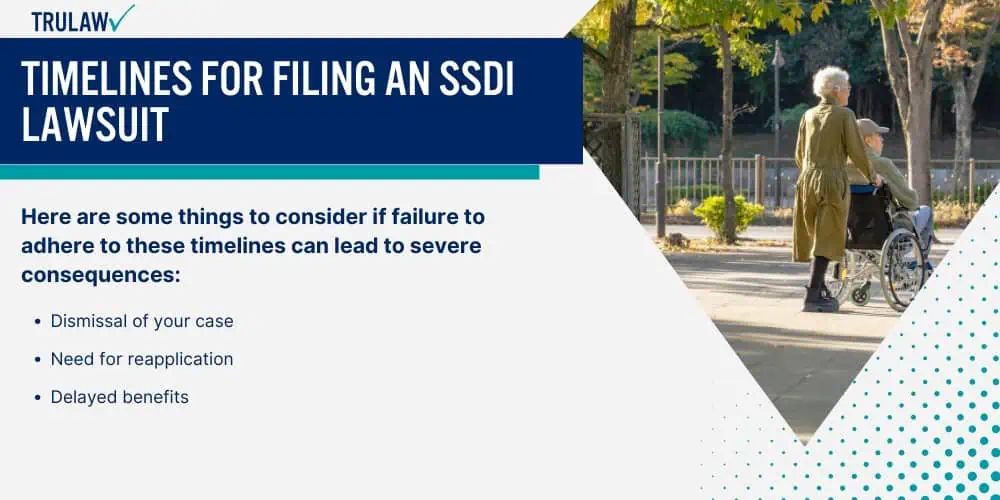SSDI Lawsuit: Decoding Denials and Knowing When to File
- Last Updated: January 15th, 2026

Attorney Jessica Paluch-Hoerman, founder of TruLaw, has over 28 years of experience as a personal injury and mass tort attorney, and previously worked as an international tax attorney at Deloitte. Jessie collaborates with attorneys nationwide — enabling her to share reliable, up-to-date legal information with our readers.
Legally Reviewed
This article has been written and reviewed for legal accuracy and clarity by the team of writers and legal experts at TruLaw and is as accurate as possible. This content should not be taken as legal advice from an attorney. If you would like to learn more about our owner and experienced injury lawyer, Jessie Paluch, you can do so here.
Fact-Checked
TruLaw does everything possible to make sure the information in this article is up to date and accurate. If you need specific legal advice about your case, contact us by using the chat on the bottom of this page. This article should not be taken as advice from an attorney.
Key takeaways:
- Recognizing when to file an SSDI lawsuit is crucial, as it's not always the best course of action for every denial.
- Receiving a lump sum settlement can significantly impact your eligibility for Social Security Disability benefits Insurance (SSDI) benefits.
- Most attorneys work on a contingency fee basis which means they only get paid if they win your case.
SSDI Lawsuit: Decoding Denials and Knowing When to File
Working with an attorney during the application process and when considering a lawsuit settlement can significantly increase the chances of approval and protect SSDI benefits.
Social Security Disability Insurance (SSDI) claims are often denied due to insufficient information, making it essential to work with an attorney during the application process.
Understanding the reasons for SSDI denials and the impact of a lawsuit settlement on SSDI benefits can help individuals navigate the SSDI lawsuit process more effectively.
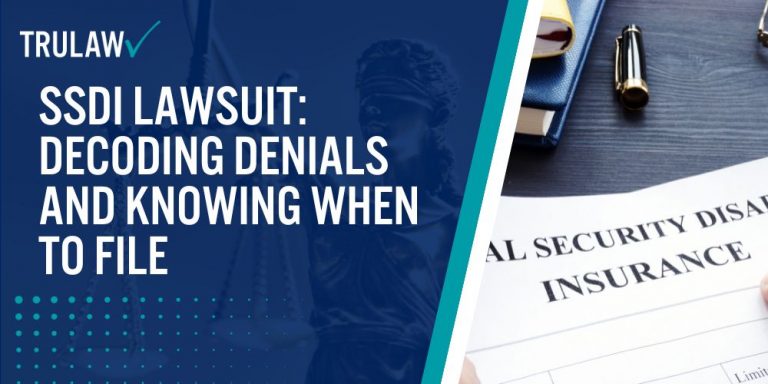
Settling a personal injury or long-term disability claim as a lump sum should not impact SSDI payments.
However, a lump sum from a workers’ compensation claim can result in a reduction or pause of SSDI payments.
To protect their benefits, individuals should consult with a disability attorney to understand their options.
Table of Contents
Common Reasons for SSDI Denials
Inadequate Medical Evidence
One of the primary reasons for SSDI lawsuit is the lack of adequate medical evidence supporting disability claims.
The Social Security Administration (SSA) requires substantial proof to determine SSI eligibility.
Here are some example, they may require:
- Detailed medical records
- Laboratory test results
- Physician’s notes on your condition
If these documents are not provided or do not adequately demonstrate a disability, the SSA may deny the claim.
Non-Compliance with Treatment Plans
Another common reason for SSDI denials involves non-compliance with prescribed treatment plans.
If an individual fails to follow their doctor’s recommendations, it can be challenging for the SSA to assess whether their condition qualifies as a disability.
Here are some examples of non-compliance might include:
- Not taking prescribed medications
- Skipping physical therapy sessions
- Ignoring dietary advice related to a specific health condition
The SSA expects individuals claiming disability benefits to make every effort to manage their conditions and improve their health.
Short-Term Disabilities For SSDI Lawsuit
Lastly, short-term disabilities that do not meet duration requirements often result in SSI benefits denials.
The SSA generally only considers conditions that have lasted or are expected to last at least 12 months or result in death as disabilities eligible for benefits.
For instance, if someone breaks a leg and is unable to work but is expected to recover within six months, they would not meet the SSDI duration requirements.
To sum up, understanding these common reasons behind SSDI denials can help individuals better prepare when applying for benefits and potentially avoid an SSDI lawsuit.
Impact of Lump Sum Settlement on SSDI Lawsuit
Lump Sum Settlement and SSDI Eligibility
Receiving a lump sum settlement can significantly impact your eligibility for Social Security Disability benefits Insurance (SSDI) benefits.
The Social Security Administration (SSA) considers the lump sum as income, which may lead to an excess over the allowed limit, thereby affecting your SSDI benefit.
For instance, if you receive a substantial settlement amount from a personal injury lawsuit or workers’ compensation claim, it could result in temporary or permanent discontinuation of your SSDI payments.
It’s essential to understand how these settlements interact with receiving SSDI benefits to avoid unexpected financial consequences.
SSI Windfall Provision
The Supplemental Security Income (SSI) windfall provision plays a crucial role in managing lump sum settlements.
This provision prevents individuals from receiving “double” benefits in a single month.
If you’re eligible for both SSI and SSDI, any lump sum payment will be divided into smaller amounts spread over several months.
This approach ensures that your monthly income doesn’t exceed the SSI limit, allowing you to maintain eligibility for both programs.
However, it’s important to note that this provision only applies if you are eligible for both supplemental security income and SSDI benefits.
Tax Implications of Lump Sum Settlements
Lump sum settlements also come with potential tax implications. Depending on the size of the settlement amount and how it is classified, you may have to pay taxes on it.
Here are some points to consider:
- Personal injury settlements are generally tax-free unless they compensate for lost wages.
- Workers’ compensation settlements are usually not taxable.
- The portion of the settlement allocated towards punitive damages is often subject to tax.
It’s advisable to consult with a tax professional or attorney specializing in disability law before accepting any lump sum offer as they can provide guidance tailored specifically to your situation.
Reconsideration And Appeals Process
Requesting Reconsideration
The first step in the reconsideration process involves contacting the Social Security Administration (SSA) directly.
The SSA is a government program that handles eligibility for various benefits, including Social Security Disability Insurance (SSDI).
If you disagree with their decision regarding your SSDI award, you can request a reconsideration.
Here are some things for reconsideration:
- Obtain the necessary forms from the SSA website or local office.
- Fill out these forms with all relevant details about your case.
- Submit them within 60 days of receiving your initial decision.
Timely filing is crucial at this stage to avoid any reduction in potential benefits.
Navigating through Appeals
If your request for reconsideration is rejected, you can appeal through an administrative law judge hearing, Appeals Council review, or Federal Court review.
Each has a unique process.
For instance, an administrative law judge hearing requires a written request within 60 days of your denial.
Waiting for a hearing date, and presenting new evidence or arguments at your hearing.
It’s crucial to file on time at each stage.
Representation during Appeals
Navigating through this complex process can be challenging without proper representation.
Legal professionals specializing in SSDI lawsuits have extensive knowledge about these government programs and can guide you through each step effectively.
They understand how to work with administration officials and present compelling arguments on behalf of their clients.
Their expertise can be invaluable when dealing with intricate laws and regulations surrounding SSDI lawsuits.
Moreover, they can help manage expenses related to the lawsuit such as court fees or documentation costs using funds from any potential award money received from winning the lawsuit.
Representation also ensures that workers’ rights are protected under agreement terms stipulated by the SSA.
They ensure that the program meets the needs of their client and that they receive the total amount of money they are entitled to.
The Role Of Medical Evidence
Comprehensive medical records bear significant impact in an SSDI lawsuit.
They serve as concrete proofs to establish the disability status of a victim.
In this context, it’s crucial to understand that these records are more than just mere documents.
They narrate the victim’s health journey, painting a vivid picture of their struggle with their condition.
Treating Physicians’ Opinions
Treating physicians play a pivotal role in shaping the outcome of an SSDI lawsuit.
Their opinions hold considerable weight in the decision-making process.
Why? Simply put, they have firsthand experience dealing with the patient and their ailment.
They’ve witnessed the person’s battle against their disability and can vouch for its severity.
Physicians provide valuable insights into how the disability has affected the individual’s work history and future prospects.
They’re trusted figures who have observed not just physical symptoms but also psychological impacts such as stress or depression.
However, it is important to note that while physicians’ opinions can sway decisions, they’re not always conclusive.
Other factors come into play too – like consistency and ongoing documentation.
Consistent Medical Treatment Documentation
Consistent medical documentation is crucial in an SSDI lawsuit.
It demonstrates your regular interaction with healthcare providers, your commitment to managing your condition, and provides concrete evidence of your ongoing hardship.
This documentation can validate your case without extra explanation.
Additionally, it could potentially boost your SSDI claim amount by eliminating uncertainties about the severity or duration of your condition.
Legal Basis for An SSDI Lawsuit
Understanding Legal Grounds
The initiation of an SSDI lawsuit necessitates a firm grasp of the legal grounds.
Federal laws govern Social Security Disability Insurance (SSDI) claims, hence any litigation related to it must be firmly rooted in these laws.
For instance, Title II of the Social Security Act outlines the procedural and substantive rights of claimants.
The claimant must have applied for benefits and been denied.
The denial was due to lack of sufficient medical evidence or incorrect evaluation by SSA.
The claimant has exhausted all administrative remedies provided by SSA.
Proving Wrongful Denial
Proving wrongful denial or termination by the Social Security Administration (SSA) is crucial in an SSDI lawsuit.
Here are some common scenarios that might constitute wrongful denial:
Misinterpretation or disregard of medical evidence
Failure to consider the combined effects of multiple impairments
Incorrect assessment of your ability to perform work activities
In such cases, solid proof like medical reports, testimonies from healthcare professionals can play a pivotal role in substantiating your case.
Federal Laws Impacting Outcomes
Federal laws play a significant role in shaping outcomes of lawsuits.
In particular, two primary statutes come into play here:
The Social Security Act and the Administrative Procedure Act in receiving SSI benefits
These federal laws set forth specific standards that SSA must adhere to when evaluating disability claims.
If these standards are not met during your claim’s evaluation process, you may have grounds for a lawsuit.
Remember, understanding these aspects is essential but navigating through them requires expertise.
Hence seeking professional help from attorneys specializing in SSDI lawsuits could significantly increase your chances of winning the case.
To sum up, filing an SSDI lawsuit requires understanding the legal grounds, proving wrongful denial or termination by SSA, and comprehending the role of federal laws.
This process might seem daunting, but with proper guidance and persistence, justice can be served.
Timelines For Filing An SSDI Lawsuit
Adhering to SSA and Court Deadlines
The Social Security Administration (SSA) and courts enforce stringent timelines which you must follow when filing an SSDI lawsuit.
This is not a process that promotes procrastination.
Every step from the initial application denial to the court hearing has specific time frames attached.
For instance, after receiving your denial letter from the SSA, you have 60 days to request a reconsideration or appeal.
If your reconsideration gets denied, you again have 60 days to request a hearing before an Administrative Law Judge (ALJ).
Understanding these deadlines is crucial as they dictate the pace at which your case progresses.
Missing Deadlines: Consequences
Here are some things to consider if failure to adhere to these timelines can lead to severe consequences:
- Dismissal of your case
- Need for reapplication
- Delayed benefits
If you miss the 60-day window for any reason, your case may be dismissed outright.
You’ll then need to start over with a new application – costing valuable time and pushing back potential benefit payments further into the future.
From Denial to Hearing: Timeframe Expectations
The timeframe between initial application denial and court hearing varies based on several factors including backlog of cases and geographical location.
Here are the things to consider for general timeline:
- Request for Reconsideration: Must be filed within 60 days of initial denial.
- Decision on Reconsideration: Typically occurs within 3-5 months of filing.
- Request for ALJ Hearing: Must be filed within 60 days of reconsideration denial.
- ALJ Hearing Date Scheduled: Can take anywhere from one year to two years after request.
This timeline underscores why it’s vital not only to understand each stage’s deadlines but also what can happen if they’re missed.
Choosing A Competent SSDI Attorney
Selecting an attorney who specializes in Social Security Disability Insurance (SSDI) cases can be a daunting task.
The right disability attorney is not just someone who understands the law but also has experience, a high success rate, and can empathize with your situation.
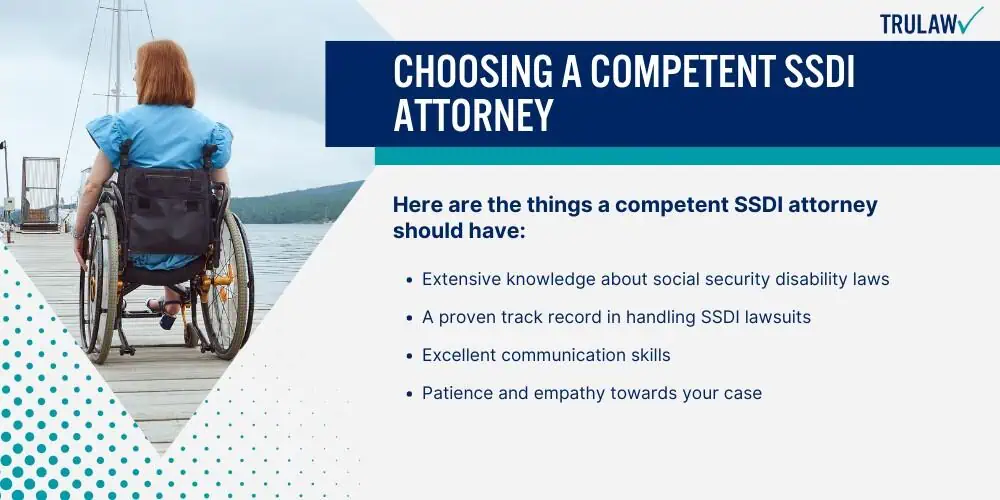
Key Qualities of an SSDI Attorney
Here are the things a competent SSDI attorney should have:
- Extensive knowledge about social security disability laws
- A proven track record in handling SSDI lawsuits
- Excellent communication skills
- Patience and empathy towards your case
It’s crucial to find an attorney who is well versed with the SSA and SSI eligibility requirements.
They should be able to guide you through the complexities of these processes without making you feel overwhelmed.
Experience and Success Rate Matters
Experience matters. An experienced disability attorney will know how to navigate through the legal system effectively.
Look for attorneys who have handled similar cases before as this increases your chances of success.
The lawyer’s success rate is another critical factor to consider.
While past performance doesn’t guarantee future results, it gives you an idea of their capabilities.
High success rates often indicate that they are skilled at arguing cases and obtaining favorable outcomes for their clients.
Understanding Your Case
Your relationship with your lawyer is personal.
You want someone who not only understands the intricacies of your case but also respects your individual circumstances.
A good personal injury attorney will take time to understand all aspects of your case and work diligently to get you the benefits you deserve.
Fee Structure and Cost Implications
Most attorneys work on a contingency fee basis which means they only get paid if they win your case.
Before hiring an attorney, ensure that you understand their fee structure thoroughly.
Here are some cost implications that might arise when hiring an SSDI attorney:
- Consultation Fees: Some lawyers charge for initial consultations while others offer this service for free.
- Filing Fees: There may be costs associated with filing the lawsuit.
- Medical Record Fees: Obtaining your medical records might involve some fees.
Remember, choosing the right SSDI attorney can make a significant difference in your case.
Take time to explore your options and choose wisely.
Maintaining Disability Benefits Amidst Personal Injury Settlements
Personal injury settlements can significantly impact ongoing disability benefits.
It’s essential to understand the potential implications of a personal injury lawsuit on SSDI Benefits.
The Impact of Settlements
A personal injury settlement may seem like a financial windfall, but it can have unintended consequences for disabled individuals.
If not properly structured, the compensation from a personal injury claim could jeopardize your eligibility for Social Security Disability Insurance (SSDI).
Receiving a lump sum from a personal injury case might push your income or assets beyond the allowed limits for SSDI.
This could result in reduced benefits or even loss of eligibility.
For example, if you receive $500,000 from a personal injury settlement and deposit it into your bank account, this amount would be considered an asset.
Social Security rules stipulate that an individual cannot have more than $2,000 in assets to qualify for SSDI.
Structuring Settlements
To avoid financial issues, it’s vital to properly manage settlement funds.
This can be done by distributing the compensation over time, known as a structured settlement, or through a Special Needs Trust (SNT).
The SNT, beneficial for disabled individuals, ensures assets don’t affect government assistance eligibility.
There are two types: First-party SNT, funded by the beneficiary’s assets, and Third-party SNT, funded by external assets like gifts.
Consultation with knowledgeable personal injury attorneys is recommended to understand how these options interact with SSDI rules.
Special Needs Trusts
Special Needs Trusts play a vital role in preserving eligibility for benefits.
Assets held in an SNT are not counted towards the SSDI asset limit, allowing beneficiaries to maintain their social security benefits while still having access to the funds for other needs.
However, setting up an SNT involves complex legal procedures and regulations.
A personal injury lawyer with experience in disability law can provide invaluable guidance through this process.
Conclusion: Key Takeaways From SSDI Lawsuits
The process of a Social Security Disability Insurance (SSDI) lawsuit can be complex and daunting.
It’s crucial to understand the common reasons for SSDI denials, the impact of lump-sum settlements, and the importance of medical evidence in these cases.
Knowledge about the legal basis for an SSDI lawsuit and timelines for filing are equally important.
Choosing a competent attorney is vital to navigate this intricate process successfully.
Maintaining disability benefits amidst personal injury settlements can also be challenging.
However, with proper guidance and understanding, it’s possible to effectively manage such situations.
For a more comprehensive grasp on SSDI lawsuits, consider seeking professional advice or consulting legal resources.
Social Security Disability Insurance Frequently Asked Questions
-
The most common reasons for SSDI denials include lack of sufficient medical evidence, income above the substantial gainful activity level, short-term disability, failure to follow prescribed treatment by a doctor, and failure to cooperate with SSA requests.
-
A lump sum settlement can potentially affect your eligibility for SSDI benefits depending on how it’s structured.
It’s advisable to consult with an experienced lawyer who understands both personal injury law and social security disability law.
-
Medical evidence is crucial in an SSDI lawsuit as it proves the existence of your disability.
The SSA relies heavily on this evidence to determine whether you meet their definition of disabled.
-
Look for an attorney who specializes in social security disability law, has experience handling cases similar to yours, possesses strong communication skills, provides clear fee structures and has positive client testimonials or reviews.
-
After receiving a denial from SSA at reconsideration stage or hearing stage you have 60 days to file a lawsuit in Federal District Court.
It’s crucial to adhere to these deadlines otherwise you might lose your right to appeal.

Managing Attorney & Owner
With over 25 years of legal experience, Jessica Paluch-Hoerman is an Illinois lawyer, a CPA, and a mother of three. She spent the first decade of her career working as an international tax attorney at Deloitte.
In 2009, Jessie co-founded her own law firm with her husband – which has scaled to over 30 employees since its conception.
In 2016, Jessie founded TruLaw, which allows her to collaborate with attorneys and legal experts across the United States on a daily basis. This hypervaluable network of experts is what enables her to share the most reliable, accurate, and up-to-date legal information with our readers!
Additional Social Security Disability Insurance resources on our website:
Here, at TruLaw, we’re committed to helping victims get the justice they deserve.
Alongside our partner law firms, we have successfully collected over $3 Billion in verdicts and settlements on behalf of injured individuals.
Would you like our help?
At TruLaw, we fiercely combat corporations that endanger individuals’ well-being. If you’ve suffered injuries and believe these well-funded entities should be held accountable, we’re here for you.
With TruLaw, you gain access to successful and seasoned lawyers who maximize your chances of success. Our lawyers invest in you—they do not receive a dime until your lawsuit reaches a successful resolution!
AFFF Lawsuit claims are being filed against manufacturers of aqueous film-forming foam (AFFF), commonly used in firefighting.
Claims allege that companies such as 3M, DuPont, and Tyco Fire Products failed to adequately warn users about the potential dangers of AFFF exposure — including increased risks of various cancers and diseases.
Depo Provera Lawsuit claims are being filed by individuals who allege they developed meningioma (a type of brain tumor) after receiving Depo-Provera birth control injections.
A 2024 study found that women using Depo-Provera for at least 1 year are five times more likely to develop meningioma brain tumors compared to those not using the drug.
Suboxone Tooth Decay Lawsuit claims are being filed against Indivior, the manufacturer of Suboxone, a medication used to treat opioid addiction.
Claims allege that Indivior failed to adequately warn users about the potential dangers of severe tooth decay and dental injuries associated with Suboxone’s sublingual film version.
Social Media Harm Lawsuits are being filed against social media companies for allegedly causing mental health issues in children and teens.
Claims allege that companies like Meta, Google, ByteDance, and Snap designed addictive platforms that led to anxiety, depression, and other mental health issues without adequately warning users or parents.
Transvaginal Mesh Lawsuits are being filed against manufacturers of transvaginal mesh products used to treat pelvic organ prolapse (POP) and stress urinary incontinence (SUI).
Claims allege that companies like Ethicon, C.R. Bard, and Boston Scientific failed to adequately warn about potential dangers — including erosion, pain, and infection.
Bair Hugger Warming Blanket Lawsuits involve claims against 3M — alleging their surgical warming blankets caused severe infections and complications (particularly in hip and knee replacement surgeries).
Plaintiffs claim 3M failed to warn about potential risks — despite knowing about increased risk of deep joint infections since 2011.
Baby Formula NEC Lawsuit claims are being filed against manufacturers of cow’s milk-based baby formula products.
Claims allege that companies like Abbott Laboratories (Similac) and Mead Johnson & Company (Enfamil) failed to warn about the increased risk of necrotizing enterocolitis (NEC) in premature infants.
Here, at TruLaw, we’re committed to helping victims get the justice they deserve.
Alongside our partner law firms, we have successfully collected over $3 Billion in verdicts and settlements on behalf of injured individuals.
Would you like our help?
